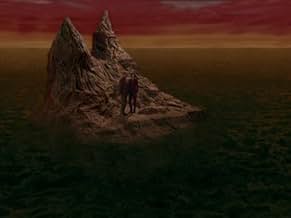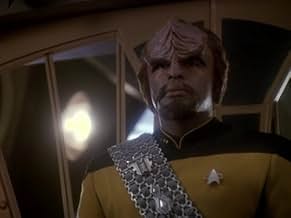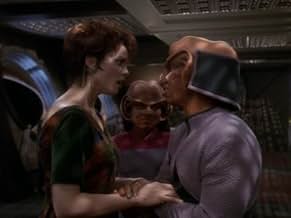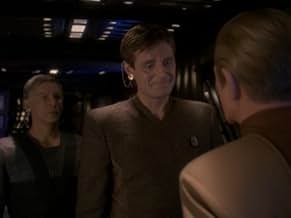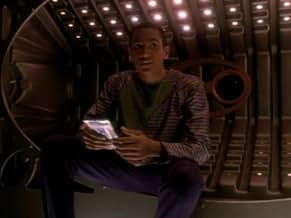Star Trek: Espacio profundo nueve
Título original: Star Trek: Deep Space Nine
En las cercanías del planeta liberado Bajor, la estación espacial Deep Space Nine protege el portal a un agujero de gusano estable hacia los confines de la galaxia.En las cercanías del planeta liberado Bajor, la estación espacial Deep Space Nine protege el portal a un agujero de gusano estable hacia los confines de la galaxia.En las cercanías del planeta liberado Bajor, la estación espacial Deep Space Nine protege el portal a un agujero de gusano estable hacia los confines de la galaxia.
- Ganó 4 premios Primetime Emmy
- 59 premios y 116 nominaciones en total
Explorar episodios
Reseñas destacadas
I won't say much about "Deep Space Nine" other than that it is the most well written, off-beat, and truly suspenseful of the Star Trek series. It is the series for everyone else... those who don't enjoy happy Star Trek (ie- "Next Generation), weird Star Trek (ie- "The Original"), or dumb Star Trek (ie- "Voyager").
It has a much darker tone, with a story-line that, if anyone watched from the beginning of the story arc to what is on currently, could understand and enjoy. It doesn't have the traditional "We are the Champions and can solve any problem in an hour". It features low-life, people making mistakes in judgement, conflicts over spirituality, and a much more human and less superficial look at one of pop culture's little universes. It features war-torn individuals and petty conflicts over land. Problems with culture-clash, government conspiracy and corruption, etc... This list could go on and on.
The main thing that makes "Deep Space Nine" different is that it is a Star Trek series for folks who don't want a lot of technobabble (not that there isn't any) Star Trek, where problems just go away or perfect people on a perfect ship that always win. It makes it more interesting for the watcher, almost like reading a novel. Most people, especially non-Trek fans, who had watched the series from its conception or joined when the story arc began about 4 years ago will know what I mean when I say this is an untraditional type of Star Trek. And those who haven't, try it. It's definitely a move away from the stereotype most folks have about the Star Trek series (though of the other Star Treks, I can't say the same.)
It has a much darker tone, with a story-line that, if anyone watched from the beginning of the story arc to what is on currently, could understand and enjoy. It doesn't have the traditional "We are the Champions and can solve any problem in an hour". It features low-life, people making mistakes in judgement, conflicts over spirituality, and a much more human and less superficial look at one of pop culture's little universes. It features war-torn individuals and petty conflicts over land. Problems with culture-clash, government conspiracy and corruption, etc... This list could go on and on.
The main thing that makes "Deep Space Nine" different is that it is a Star Trek series for folks who don't want a lot of technobabble (not that there isn't any) Star Trek, where problems just go away or perfect people on a perfect ship that always win. It makes it more interesting for the watcher, almost like reading a novel. Most people, especially non-Trek fans, who had watched the series from its conception or joined when the story arc began about 4 years ago will know what I mean when I say this is an untraditional type of Star Trek. And those who haven't, try it. It's definitely a move away from the stereotype most folks have about the Star Trek series (though of the other Star Treks, I can't say the same.)
10gabe-129
I will say it started off kinda strange. most star trek series is spent having adventures on a star ship. This series for the most part stays on Deep space nine. Although there is still plenty of adventure. The thing that really makes this show so good is its large cast. It has many reoccurring secondary characters that help the the space station seem like a fascinating place for the show to take place. This story is much darker and more thought provoking than the other series. This series has so many things going for it.
Characters actually grow and change realistically and has reoccurring villains that have real depth and you never know quite what they are going to do. kai Winn and gul dukat both grow and change from series beginning to end and are the best villains ever.
This show has depth. It not all simple good guy and bad guy. There are complex motives behind many of the bad guys. Even the federation does some very bad things when they are in dire situations. People really have to live with the choices they have made. Problems from one episode don't just end with the episode like with TNG or the OS. you have to watch this from episode 1 to the end in order.
This show is still very relevant today. Terrorism, genocide, martial law are all seen in this series.
Characters actually grow and change realistically and has reoccurring villains that have real depth and you never know quite what they are going to do. kai Winn and gul dukat both grow and change from series beginning to end and are the best villains ever.
This show has depth. It not all simple good guy and bad guy. There are complex motives behind many of the bad guys. Even the federation does some very bad things when they are in dire situations. People really have to live with the choices they have made. Problems from one episode don't just end with the episode like with TNG or the OS. you have to watch this from episode 1 to the end in order.
This show is still very relevant today. Terrorism, genocide, martial law are all seen in this series.
Before Deep Space Nine aired back in 1993 I felt quite a bit of apprehension. How could they have a Star Trek series without a ship going off exploring? I wasn't going to watch it but being a fan Star Trek and Star Trek:The Next Generation I had to watch it.
I was pleasantly surprised by Deep Space Nine. The stories were fantastic. The writers were very imaginative-they had to be. There was no jetting off in starships from planet to planet. Everything was set on Deep Space Nine which made for more interesting storylines. And storylines continued throughout the season. Deep Space Nine was not like most sci-fi shows where starships leave a planet at the end of the episode and jet off to their next adventure. Instead, all the action came to Deep Space Nine instead.
The characters were good too and not all of them were buddies with each other. Avery Brooks made a good Commander and the talented Nana Visitor did a good job playing Kira. Two other memorable characters were the mysterious Odo and the slimy Quark.
If anyone wants to watch a thought provoking show without seeing starships jetting off from galaxy to galaxy then this is the show for you.
I was pleasantly surprised by Deep Space Nine. The stories were fantastic. The writers were very imaginative-they had to be. There was no jetting off in starships from planet to planet. Everything was set on Deep Space Nine which made for more interesting storylines. And storylines continued throughout the season. Deep Space Nine was not like most sci-fi shows where starships leave a planet at the end of the episode and jet off to their next adventure. Instead, all the action came to Deep Space Nine instead.
The characters were good too and not all of them were buddies with each other. Avery Brooks made a good Commander and the talented Nana Visitor did a good job playing Kira. Two other memorable characters were the mysterious Odo and the slimy Quark.
If anyone wants to watch a thought provoking show without seeing starships jetting off from galaxy to galaxy then this is the show for you.
10mstomaso
DS9 is one of my all-time favorite television shows. It edges out Star Trek's original series just barely as my favorite in the franchise. I am not going to state that it's the best Star Trek series, because it definitely will not appeal to everybody, but it is my favorite.
DS9 deviates from the Trek franchise formula in an important way - it is based on one location - a Cardassian-built space station near the planet Bejor. So even the architecture of the main set is alien - not another sterile militaristic star ship inhabited by a primarily white European crew - but a true Babel. Bejor has just been liberated from 60 years of occupation by an expansionist militaristic race - the Cardassians. Both Bejorans and Cardassians will play important roles throughout DS9. Since the station does not move much during the show's seven year run, DS9 has a much stronger sense of place than the other ST series, and is able to develop story arc and character continuity much more powerfully than the others.
All of the major characters and most of the frequent returning characters have their own interwoven story arcs - most of which span the entire series. Ben Sisko (Avery Brooks), the station's commander, is a somewhat disgruntled Star Fleet officer who has several personal vendettas which have almost driven him from Star Fleet. He is also a single parent and a genius. In the very first episode, Sisko's arc begins and it is clear that his story will be the frame within which the entire series is organized - though the reasons for this will no become entirely clear until near the end. Also memorable are the gruff, shape-shifting Chief Constable Odo(Rene Auberjunois) who does not know what he is and where he came from; Kira (Nana Visitor) Sisko's aggressive and intense Bajoran second officer; Garak (Andy Robinson) a Cardassian Tailor and - possibly - spy, who is easily the most well-developed, well-acted and interesting recurring guest star Star Trek has ever had; Jadzia Dax (Terry Farrell) - the beautiful Trill science officer whose consciousness is enhanced by the memories and personality of a 600 year old symbiotic slug who lives in her stomach and has inhabited dozens of previous hosts; Julian Bashir (Alex Siddig) - the station's young, brilliant, adventurous and naive doctor; and Quark (Armin Shimmerman), the greedy, conniving, but entirely lovable Ferengi casino owner.
The characters, cast, and serialized stories make DS9 stand apart from the franchise as the most powerfully plotted, intensely dramatic and politically charged Star Trek ever. The show is, however, not for those with limited attention spans and a disdain for complexity. While it isn't exactly hard to follow, the dialog is often dense and DS9 - more than any other Trek show - uses non-verbal communication very well. Brooks, Visitor and Robinson - all of whom are masters at this - are particularly non-verbal and make a big impression from the first few episodes.
Throughout the series, there are constant underlying political intrigues and surprisingly little filler. Almost every story connects with the main story arc (Sisko's and Bejor's) in one way or another, and no time is wasted with aimless experimentation by the writing team (a problem Voyager and Enterprise both suffered from).
The production is consistently theatrical in scope. The special effects are still - even today - above average for television, and even the new BSG doesn't approach the scope and coherence of the plot.
Highly recommended for bright people looking for something more than typical TV drama normally delivers.
DS9 deviates from the Trek franchise formula in an important way - it is based on one location - a Cardassian-built space station near the planet Bejor. So even the architecture of the main set is alien - not another sterile militaristic star ship inhabited by a primarily white European crew - but a true Babel. Bejor has just been liberated from 60 years of occupation by an expansionist militaristic race - the Cardassians. Both Bejorans and Cardassians will play important roles throughout DS9. Since the station does not move much during the show's seven year run, DS9 has a much stronger sense of place than the other ST series, and is able to develop story arc and character continuity much more powerfully than the others.
All of the major characters and most of the frequent returning characters have their own interwoven story arcs - most of which span the entire series. Ben Sisko (Avery Brooks), the station's commander, is a somewhat disgruntled Star Fleet officer who has several personal vendettas which have almost driven him from Star Fleet. He is also a single parent and a genius. In the very first episode, Sisko's arc begins and it is clear that his story will be the frame within which the entire series is organized - though the reasons for this will no become entirely clear until near the end. Also memorable are the gruff, shape-shifting Chief Constable Odo(Rene Auberjunois) who does not know what he is and where he came from; Kira (Nana Visitor) Sisko's aggressive and intense Bajoran second officer; Garak (Andy Robinson) a Cardassian Tailor and - possibly - spy, who is easily the most well-developed, well-acted and interesting recurring guest star Star Trek has ever had; Jadzia Dax (Terry Farrell) - the beautiful Trill science officer whose consciousness is enhanced by the memories and personality of a 600 year old symbiotic slug who lives in her stomach and has inhabited dozens of previous hosts; Julian Bashir (Alex Siddig) - the station's young, brilliant, adventurous and naive doctor; and Quark (Armin Shimmerman), the greedy, conniving, but entirely lovable Ferengi casino owner.
The characters, cast, and serialized stories make DS9 stand apart from the franchise as the most powerfully plotted, intensely dramatic and politically charged Star Trek ever. The show is, however, not for those with limited attention spans and a disdain for complexity. While it isn't exactly hard to follow, the dialog is often dense and DS9 - more than any other Trek show - uses non-verbal communication very well. Brooks, Visitor and Robinson - all of whom are masters at this - are particularly non-verbal and make a big impression from the first few episodes.
Throughout the series, there are constant underlying political intrigues and surprisingly little filler. Almost every story connects with the main story arc (Sisko's and Bejor's) in one way or another, and no time is wasted with aimless experimentation by the writing team (a problem Voyager and Enterprise both suffered from).
The production is consistently theatrical in scope. The special effects are still - even today - above average for television, and even the new BSG doesn't approach the scope and coherence of the plot.
Highly recommended for bright people looking for something more than typical TV drama normally delivers.
Been watching the franchise series' in reverse order from a modern day standpoint comparison. Initially felt some of the characters in DS9 were a little irritating as some others have thought, but as it progressed through the series' I was found the character development to reverse my initial thoughts thankfully. Quark as a character is an example of this.
As like many others in the Star Trek, some of the storylines are derivative or overlapping of series. (no show is perfect) This is to be expected from a large number of episodes per season. Luckily there was a continuing narratives throughout to keep one engaged. The inclusion of the USS Defiant starship added another layer of interest, familiarity and diversity to plotlines.
On the whole, the premise of the series being based on a space station adds much-needed interest to an otherwise Starship-based franchises. The Next Generation, Voyager and Enterprise all share this narrative to varying degrees of success.
Onto re-watching The Next Generation after this. "Shut up, Wesley!"
As like many others in the Star Trek, some of the storylines are derivative or overlapping of series. (no show is perfect) This is to be expected from a large number of episodes per season. Luckily there was a continuing narratives throughout to keep one engaged. The inclusion of the USS Defiant starship added another layer of interest, familiarity and diversity to plotlines.
On the whole, the premise of the series being based on a space station adds much-needed interest to an otherwise Starship-based franchises. The Next Generation, Voyager and Enterprise all share this narrative to varying degrees of success.
Onto re-watching The Next Generation after this. "Shut up, Wesley!"
Stellar Photos From the "Star Trek" TV Universe
Stellar Photos From the "Star Trek" TV Universe
We've rounded up some of our favorite photos from across the "Star Trek" TV universe. Take a look at memorable moments from red carpet premieres and classic episodes.
¿Sabías que...?
- CuriosidadesKira was a last-minute addition to the cast. The original plan was to include the Star Trek: La nueva generación (1987) character of Ro Laren, but Michelle Forbes didn't want to do a series at the time.
- PifiasIn the first three seasons, CDR Sisko refers to his father in the past tense, even talking about his slow demise and death from some unknown ailment. But starting in the fourth season ("Homefront"), Joseph Sisko is alive and well running a restaurant in New Orleans. Joseph appears in a total of six episodes throughout the last 4 seasons.
- Créditos adicionalesThe opening credits for "Emissary" lacked the wormhole opening that all future episodes featured. Starting with Season 4, the opening credits included additional spacecraft and activity around the station, including the Defiant flying into the wormhole.
- Versiones alternativasSeveral episodes were originally shown as 2-hour movies. They were later edited into two-part 60 minute episodes for later airings.
- ConexionesEdited into Star Trek: Voyager: Unity (1997)
- Banda sonoraStar Trek: Deep Space Nine - Main Title
Written by Dennis McCarthy
Selecciones populares
Inicia sesión para calificar y añadir a tu lista para recibir recomendaciones personalizadas
Detalles
- Fecha de lanzamiento
- País de origen
- Sitios oficiales
- Idiomas
- Títulos en diferentes países
- Star Trek: Deep Space Nine
- Localizaciones del rodaje
- Empresa productora
- Ver más compañías en los créditos en IMDbPro
Contribuir a esta página
Sugerir un cambio o añadir el contenido que falta



